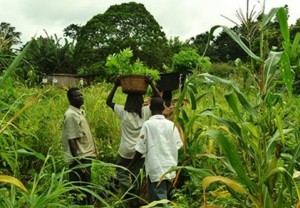Peasant farmers kick against Plant Breeders Bill
 The Peasant Farmers Association of Ghana (PFAG), has called on government and Parliament to halt the passage of the Plant Breeders Bill (PBB) and to ensure further consultations with farmers.
The Peasant Farmers Association of Ghana (PFAG), has called on government and Parliament to halt the passage of the Plant Breeders Bill (PBB) and to ensure further consultations with farmers.
The Plant Breeders Bill, among other things, is to ensure a genetic diversity of food crops but has faced strong resistance from farmer groups, the Convention Peoples Party and civil society.
The Bill has been in Parliament since 2013.
Madam Victoria Adongo, PFAG Programmes Coordinator, who made the call at a news conference in Accra said the bill poses security risk and danger to the survival of farmers and if passed into law, would lead to abject poverty and misery of farmers.
“We are demanding for our right to land, right to our seed and food systems and our right to choose whether we want Genetically Modified foods,” she noted.
The conference was organised to mark the 20th Anniversary of the International Day in Solidarity with Peasant Farmers and to ensure food sustainability in society as a whole.
Ghana’s observation of the International Day in Solidarity with peasant farmers on the theme: “2016 celebration of the peasant struggle: the future of agriculture in Ghana” is to highlight the challenges that seek to set the wheels of gain of peasant farmers backward.
Ms Adongo said the PBB if passed by Parliament would deny small holder farmers the right to save and exchange their own seed. It would also jeopardise the food sovereignty of the country by allowing foreign multinationals to take-over the seed industry.
The situation is very serious for a country that largely depends on agriculture to feed and develop its economy, she said.
Madam Adongo noted that the recent decline in agricultural performance in Ghana could be linked to the continuous undermining of peasant farmers and recognising the need to prioritise farm lands for mining, estate development, biofuel by corporate institutions and other commercial activities.
She appealed to chiefs to stop giving out peasant farm lands to corporations and mining companies but rather protect and support them as they are key investors in the sector.
She also appealed to government and financial institutions to reconsider their focus on support to large-scale farming as against majority of about 90 per cent our agricultural sector operators who are peasant farmers.
Ms Adongo added that land grabbing for other commercial activities in the name of globalisation and development is also affecting farmers greatly hence the need for mechanisms to stop that activity.
Nana Ameyaw Manu, Vice Board Chair of PFAG, urged the farmers not to relent in their efforts but rather work hard to put food on the table of many.
Nana Manu also said the PBB would affect the livelihood of peasant farmers and appealed to government to consider their plea.
Mr Yaw Opoku, Agricultural Sovereignty of Ghana member called on all peasant farmers to come together and kick against the passage of the bill.
He said the PBB when passed would guarantee patenting of seeds, giving authority to the one who brings it and that one would need permission or buy from the one who produced it.
Mr Opoku who is a legal practitioner noted that “in the bill you will either suffer criminal charge or you will go for a civil action that allows the producer to cut down all your farm produce”.
He said the moment agricultural products are patented as against the normal ones it creates lots of problems for farmers because they no longer can use their own seeds, they always have to buy because the GMOs have terminated genes such that unless one buys it from them on a yearly basis, farmers would not have the needed yields.
He said many factors affect the yield of a crop such as the soil, fertilizers, rains among others “so it is a lie to assert that it is only GMOs that can increase agricultural yields”.
Mr Opoku noted that peasant farmers have no money, adding “how would they get the said monies to buy breeders yearly”.
“GMOs and Plant Breeder when allowed to operate will eventually do away with all our local and traditional produce which will affect us greatly health wise, hence our fight against its passage,” he stated.
Source: GNA
